List of governors of Pennsylvania
From Wikipedia, the free encyclopedia
The governor of Pennsylvania is the head of government of the U.S. state of Pennsylvania, as well as commander-in-chief of the state's national guard.[2]
| Governor of the Commonwealth of Pennsylvania | |
|---|---|
 Seal of the governor | |
 Flag of the governor | |
| Government of Pennsylvania | |
| Style |
|
| Status | |
| Residence | Governor's Residence |
| Term length | Four years, renewable once consecutively |
| Inaugural holder | Thomas Mifflin |
| Formation | December 21, 1790 |
| Succession | Line of succession |
| Deputy | Lieutenant Governor of Pennsylvania |
| Salary | $201,729 (2020)[1] |
| Website | www |
The governor has a duty to enforce state laws and the power to approve or veto bills passed by the Pennsylvania General Assembly,[3] as well as to convene the legislature.[4] The governor may grant pardons except in cases of impeachment, but only when recommended by the Board of Pardons.[5]
There have been seven presidents and 48 governors of Pennsylvania, with two governors (Robert E. Pattison and Gifford Pinchot) serving non-consecutive terms, totaling 55 terms in both offices. The longest term was that of the first governor, Thomas Mifflin, who served three full terms as governor in addition to two years as President of the Continental Congress. The shortest term belonged to John C. Bell Jr., who served only 19 days as acting governor after his predecessor, Edward Martin, resigned.
The current governor is Josh Shapiro, who took office on January 17, 2023.
Governors
Summarize
Perspective
Pennsylvania was one of the original Thirteen Colonies and was admitted as a state on December 12, 1787.[6] Before it declared its independence, Pennsylvania was a colony of the Kingdom of Great Britain.
Presidents of the Supreme Executive Council
The Pennsylvania Constitution of 1776 created the Supreme Executive Council as the state's executive branch, with a president as its head.[7] The president was chosen annually by the council, though with no specific term dates.[8]
The constitution created the position of "vice-president", though no provision was made if the office of the president became vacant, which occurred four times later. Contemporary sources continue to label the chief executive in such times as the vice-president, without any notion of succeeding in the presidency. One acting president, George Bryan, was subsequently recognized later as a full-fledged governor, due to his acting as president for over six months.
| No. | President | Term in office | Vice-President | |
|---|---|---|---|---|
| 1 |  |
Thomas Wharton Jr. (1735–1778) [9] |
March 5, 1777[10] – May 23, 1778 (died in office) |
George Bryan |
| 2 |  |
George Bryan (1731–1791) [11] |
May 23, 1778[10] – December 22, 1778 (left office) |
acting as president[a] |
| 3 |  |
Joseph Reed (1741–1785) [12] |
December 22, 1778[10] – November 15, 1781 (term-limited)[b] |
George Bryan (resigned October 11, 1779) |
| Matthew Smith (resigned November 15, 1779) | ||||
| William Moore | ||||
| 4 |  |
William Moore (1735–1793) [15] |
November 15, 1781[10] – November 7, 1782 (left office) |
James Potter |
| 5 |  |
John Dickinson (1732–1808) [16] |
November 7, 1782[10] – October 18, 1785 (term-limited)[b] |
James Ewing |
| James Irvine (resigned October 10, 1785) | ||||
| Charles Biddle | ||||
| 6 |  |
Benjamin Franklin (1706–1790) [17] |
October 18, 1785[10] – November 5, 1788 (term-limited)[b] | |
| Peter Muhlenberg (resigned October 14, 1788) | ||||
| David Redick | ||||
| 7 |  |
Thomas Mifflin (1744–1800) [18][19] |
November 5, 1788[10] – December 21, 1790 (became state governor) |
George Ross |
Governors of the Commonwealth of Pennsylvania

The 1790 constitution abolished the council and replaced the president with a governor,[20] and established a three-year term for governor commencing on the third Tuesday of the December following the election, with governors not allowed to serve more than nine out of any twelve years.[21] The 1838 constitution moved the start of the term to the third Tuesday of the January following the election, and allowed governors to only serve six out of any nine years.[22] The 1874 constitution lengthened the term to four years, and prohibited governors from succeeding themselves.[23] The current constitution of 1968 changed this to allow governors to serve two consecutive terms, with no lifetime limit.[24]
Under the 1968 constitution, Milton Shapp was the first governor to serve two terms, and Tom Corbett was the first incumbent governor to lose a re-election bid.
If the office of governor becomes vacant through death, resignation, or conviction on impeachment, the lieutenant governor becomes governor for the remainder of the term; if the office is only temporarily vacant due to disability of the governor, the lieutenant governor only acts out the duties of governor.[25] Should both offices be vacant, the president pro tempore of the state senate becomes governor.[26] The position of a lieutenant governor was created in the 1874 constitution; prior to then, the speaker of the senate would act as governor in cases of vacancy. Originally, the lieutenant governor could only act as governor; it was not until the 1968 constitution that the lieutenant governor could actually become the sitting governor in that fashion. The office of governor has been vacant for an extended period once before, a 17-day gap in 1848 between the resignation of the previous governor and the swearing in of his acting successor. Governors and lieutenant governors are elected on the same political party ticket.[27]
| No. | Governor | Term in office | Party | Election | Lt. Governor[c][d] | |||
|---|---|---|---|---|---|---|---|---|
| 1 |  |
Thomas Mifflin (1744–1800) [18][19] |
December 21, 1790[28] – December 17, 1799 (term-limited)[e] |
None[f] | 1790 | Office did not exist | ||
| Democratic- Republican[31] |
1793 | |||||||
| 1796 | ||||||||
| 2 | 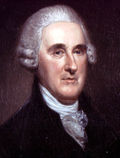 |
Thomas McKean (1734–1817) [32][33] |
December 17, 1799[34] – December 20, 1808 (term-limited)[e] |
Democratic- Republican[g] |
1799 | |||
| 1802 | ||||||||
| Constitutionalist | 1805 | |||||||
| 3 | 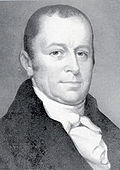 |
Simon Snyder (1759–1819) [37][38] |
December 20, 1808[39] – December 16, 1817 (term-limited)[e] |
Democratic- Republican[40] |
1808 | |||
| 1811 | ||||||||
| 1814 | ||||||||
| 4 |  |
William Findlay (1768–1846) [41][42] |
December 16, 1817[43] – December 19, 1820 (lost election) |
Democratic- Republican[40] |
1817 | |||
| 5 |  |
Joseph Hiester (1752–1832) [44][45] |
December 19, 1820[46] – December 16, 1823 (did not run) |
Federalist[h] | 1820 | |||
| 6 |  |
John Andrew Shulze (1775–1852) [48][49] |
December 16, 1823[50] – December 15, 1829 (did not run) |
Democratic- Republican[40] |
1823 | |||
| Jacksonian | 1826 | |||||||
| 7 | 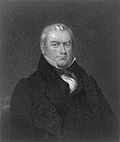 |
George Wolf (1777–1840) [51][52] |
December 15, 1829[53] – December 15, 1835 (lost election) |
Democratic[40] | 1829 | |||
| 1832 | ||||||||
| 8 | 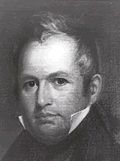 |
Joseph Ritner (1780–1869) [54][55] |
December 15, 1835[56] – January 15, 1839 (lost election) |
Anti-Masonic[40] | 1835 | |||
| 9 | 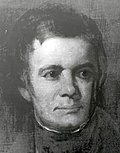 |
David R. Porter (1788–1867) [57][58] |
January 15, 1839[59] – January 21, 1845 (term-limited)[i] |
Democratic[40] | 1838 | |||
| 1841 | ||||||||
| 10 |  |
Francis R. Shunk (1788–1848) [61][62] |
January 21, 1845[63] – July 9, 1848 (resigned)[j] |
Democratic[40] | 1844 | |||
| 1847 | ||||||||
| 11 |  |
William F. Johnston (1808–1872) [64][65] |
July 9, 1848[k] – January 20, 1852 (lost election) |
Whig[40] | Speaker of the Senate acting | |||
| 1848 | ||||||||
| 12 | 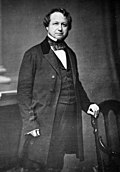 |
William Bigler (1814–1880) [69][70] |
January 20, 1852[71] – January 16, 1855 (lost election) |
Democratic[40] | 1851 | |||
| 13 |  |
James Pollock (1810–1890) [72][73] |
January 16, 1855[74] – January 19, 1858 (did not run)[72] |
Whig[l] | 1854 | |||
| 14 |  |
William F. Packer (1807–1870) [75][76] |
January 19, 1858[77] – January 15, 1861 (did not run) |
Democratic[40] | 1857 | |||
| 15 |  |
Andrew Gregg Curtin (d. 1894) [78][79] |
January 15, 1861[80] – January 15, 1867 (term-limited)[i] |
Republican[40] | 1860 | |||
| 1863 | ||||||||
| 16 |  |
John W. Geary (1819–1873) [81][82] |
January 15, 1867[83] – January 21, 1873 (term-limited)[i] |
Republican[40] | 1866 | |||
| 1869 | ||||||||
| 17 |  |
John F. Hartranft (1830–1889) [84][85] |
January 21, 1873[86] – January 21, 1879 (term-limited)[m] |
Republican[40] | 1872 | |||
| 1875 | John Latta | |||||||
| 18 |  |
Henry M. Hoyt (1830–1892) [88][89] |
January 21, 1879[90] – January 16, 1883 (term-limited)[m] |
Republican[40] | 1878 | Charles Warren Stone | ||
| 19 |  |
Robert E. Pattison (1850–1904) [91][92] |
January 16, 1883[93] – January 18, 1887 (term-limited)[m] |
Democratic[40] | 1882 | Chauncey Forward Black | ||
| 20 | 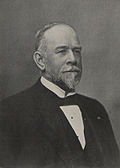 |
James A. Beaver (1837–1914) [94][95] |
January 18, 1887[96] – January 20, 1891 (term-limited)[m] |
Republican[40] | 1886 | William T. Davies | ||
| 19 |  |
Robert E. Pattison (1850–1904) [91][92] |
January 20, 1891[97] – January 15, 1895 (term-limited)[m] |
Democratic[40] | 1890 | Louis Arthur Watres | ||
| 21 |  |
Daniel H. Hastings (1849–1903) [98][99] |
January 15, 1895[100] – January 17, 1899 (term-limited)[m] |
Republican[40] | 1894 | Walter Lyon | ||
| 22 |  |
William A. Stone (1846–1920) [101][102] |
January 17, 1899[103] – January 20, 1903 (term-limited)[m] |
Republican[40] | 1898 | John P. S. Gobin | ||
| 23 |  |
Samuel W. Pennypacker (1843–1916) [104][105] |
January 20, 1903[106] – January 15, 1907 (term-limited)[m] |
Republican[40] | 1902 | William M. Brown | ||
| 24 | 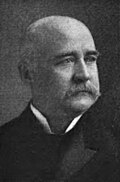 |
Edwin Sydney Stuart (1853–1937) [107][108] |
January 15, 1907[109] – January 17, 1911 (term-limited)[m] |
Republican[40] | 1906 | Robert S. Murphy | ||
| 25 | 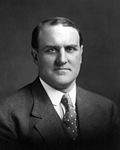 |
John K. Tener (1863–1946) [110][111] |
January 17, 1911[112] – January 19, 1915 (term-limited)[m] |
Republican[40] | 1910 | John Merriman Reynolds | ||
| 26 |  |
Martin Grove Brumbaugh (1862–1930) [113][114] |
January 19, 1915[115] – January 21, 1919 (term-limited)[m] |
Republican[40] | 1914 | Frank B. McClain | ||
| 27 |  |
William Cameron Sproul (1870–1928) [116][117] |
January 21, 1919[118] – January 16, 1923 (term-limited)[m] |
Republican[40] | 1918 | Edward E. Beidleman | ||
| 28 |  |
Gifford Pinchot (1865–1946) [119][120] |
January 16, 1923[121] – January 18, 1927 (term-limited)[m] |
Republican[40] | 1922 | David J. Davis | ||
| 29 |  |
John Stuchell Fisher (1867–1940) [122][123] |
January 18, 1927[124] – January 20, 1931 (term-limited)[m] |
Republican[40] | 1926 | Arthur James | ||
| 28 |  |
Gifford Pinchot (1865–1946) [119][120] |
January 20, 1931[125] – January 15, 1935 (term-limited)[m] |
Republican[40] | 1930 | Edward C. Shannon | ||
| 30 | 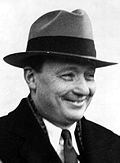 |
George Howard Earle III (1890–1974) [126][127] |
January 15, 1935[128] – January 17, 1939 (term-limited)[m] |
Democratic[40] | 1934 | Thomas Kennedy | ||
| 31 |  |
Arthur James (1883–1973) [129][130] |
January 17, 1939[131] – January 19, 1943 (term-limited)[m] |
Republican[40] | 1938 | Samuel S. Lewis | ||
| 32 | 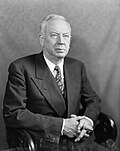 |
Edward Martin (1879–1967) [132][133] |
January 19, 1943[134] – January 2, 1947 (resigned)[n] |
Republican[40] | 1942 | John C. Bell Jr. | ||
| 33 |  |
John C. Bell Jr. (1892–1974) [135][136] |
January 2, 1947[137] – January 21, 1947 (successor took office) |
Republican[40] | Succeeded from lieutenant governor |
Vacant | ||
| 34 |  |
James H. Duff (1883–1969) [138][139] |
January 21, 1947[140] – January 16, 1951 (term-limited)[m] |
Republican[40] | 1946 | Daniel Strickler | ||
| 35 | 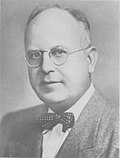 |
John S. Fine (1893–1978) [141][142] |
January 16, 1951[143] – January 18, 1955 (term-limited)[m] |
Republican[40] | 1950 | Lloyd H. Wood | ||
| 36 |  |
George M. Leader (1918–2013) [144][145] |
January 18, 1955[146] – January 20, 1959 (term-limited)[m] |
Democratic[40] | 1954 | Roy E. Furman | ||
| 37 |  |
David L. Lawrence (1889–1966) [147][148] |
January 20, 1959[149] – January 15, 1963 (term-limited)[m] |
Democratic[40] | 1958 | John Morgan Davis | ||
| 38 | 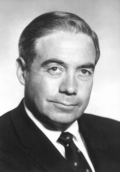 |
William Scranton (1917–2013) [150][151] |
January 15, 1963[152] – January 17, 1967 (term-limited)[m] |
Republican[40] | 1962 | Raymond P. Shafer | ||
| 39 |  |
Raymond P. Shafer (1917–2006) [153][154] |
January 17, 1967[155] – January 19, 1971 (term-limited)[m] |
Republican[40] | 1966 | Raymond J. Broderick | ||
| 40 |  |
Milton Shapp (1912–1994) [156][157] |
January 19, 1971[158] – January 16, 1979 (term-limited)[o] |
Democratic[40] | 1970 | Ernest Kline | ||
| 1974 | ||||||||
| 41 |  |
Dick Thornburgh (1932–2020) [160] |
January 16, 1979[161] – January 20, 1987 (term-limited)[o] |
Republican[160] | 1978 | William Scranton III | ||
| 1982 | ||||||||
| 42 |  |
Bob Casey Sr. (1932–2000) [162] |
January 20, 1987[163] – January 17, 1995 (term-limited)[o] |
Democratic[162] | 1986 | Mark Singel[p] | ||
| 1990 | ||||||||
| 43 | 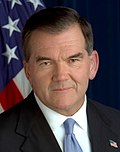 |
Tom Ridge (b. 1945) [165] |
January 17, 1995[166] – October 5, 2001 (resigned)[q] |
Republican[165] | 1994 | Mark Schweiker | ||
| 1998 | ||||||||
| 44 |  |
Mark Schweiker (b. 1953) [167] |
October 5, 2001[168] – January 21, 2003 (did not run) |
Republican[167] | Succeeded from lieutenant governor |
Robert Jubelirer | ||
| 45 |  |
Ed Rendell (b. 1944) [169] |
January 21, 2003[170] – January 18, 2011 (term-limited)[o] |
Democratic[169] | 2002 | Catherine Baker Knoll (died November 12, 2008) | ||
| 2006 | ||||||||
| Joe Scarnati[r] (acting) | ||||||||
| 46 |  |
Tom Corbett (b. 1949) [171] |
January 18, 2011[172] – January 20, 2015 (lost election) |
Republican[171] | 2010 | Jim Cawley | ||
| 47 |  |
Tom Wolf (b. 1948) [173] |
January 20, 2015[174] – January 17, 2023 (term-limited)[o] |
Democratic[173] | 2014 | Mike Stack | ||
| 2018 | John Fetterman (resigned January 3, 2023) | |||||||
| Kim Ward[r] (acting) | ||||||||
| 48 |  |
Josh Shapiro (b. 1973) [175] |
January 17, 2023[176] – Incumbent[s] |
Democratic[175] | 2022 | Austin Davis | ||
See also
Notes
- Under the 1790 constitution, governors were ineligible to hold the office longer than nine in any term of twelve years.[29]
- The Federalist and Democratic-Republican parties jointly nominated Mifflin, but he himself carried no party label.[30]
- Under the 1838 constitution, governors were ineligible to hold the office longer than six in any term of nine years.[60]
- Shunk resigned due to illness; he died of tuberculosis 11 days later.[61]
- Pollock also represented the American Party.[40]
- Under the 1874 constitution, governors were ineligible to the office for the next succeeding term.[87]
- Martin resigned, having been elected to the United States Senate.[132]
- Under a 1967 amendment to the constitution, governors may succeed themselves for one additional term.[159]
- Singel acted as governor from June 14 to December 21, 1993, while Casey recovered from a heart-liver transplant.[164]
- Ridge resigned, having been appointed Director of the Office of Homeland Security.[165]
- Represented the Republican Party
- Shapiro's term will expire on January 19, 2027.
References
External links
Wikiwand - on
Seamless Wikipedia browsing. On steroids.

